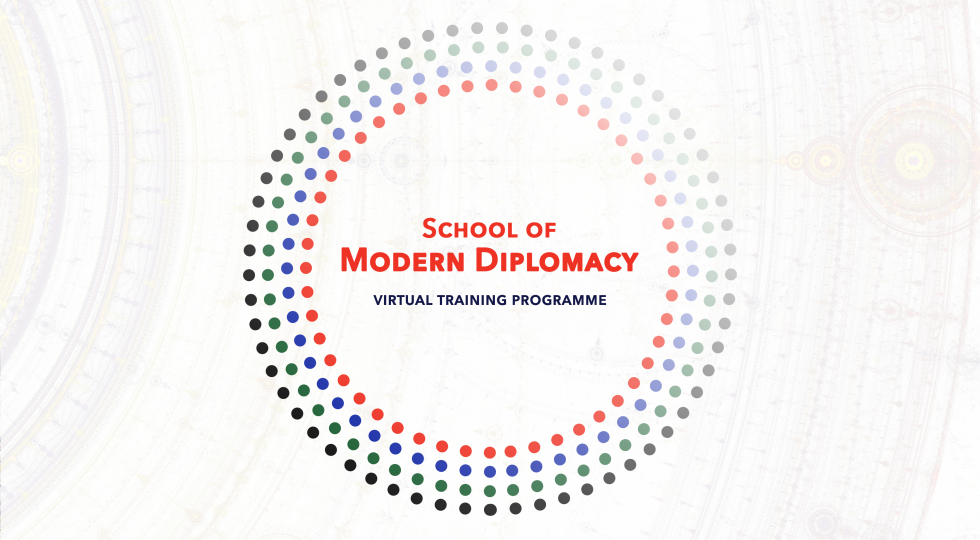School of Modern Diplomacy 2025

The art of diplomacy has evolved. In an age where a few sentences from a world leader on social media can give a green light to foreign military action or move markets, there is no denying that the classic notions of diplomacy no longer reflect reality.
What has taken its place is a modern, multi-layered approach that encompasses all the levels and interdisciplinarity of the international and interconnected global sphere. Today’s diplomats must operate across sectors and platforms, equipped with the tools to navigate a complex international landscape shaped by technology, climate urgency, economic shifts, and cultural interconnection.
This programme, organised by UNU-CRIS in collaboration with the Department of Foreign Affairs of Flanders, Ghent University and the Brussels School of Governance (BSoG/VUB), trains its participants on how to enact effective diplomacy in today’s turbulent world. It gives participants direct access to the practitioners, academics and policymakers at the forefront of their fields and operating at the highest levels, with modules covering the different facets of modern diplomacy and how they are being employed the world over to shape ideas, discussion and the world we live in.
"I liked the general organisation by the UNU-CRIS team, and most importantly the high calibre of experts who lectured during the school. Even the selection process of the participants was well thought-out, consisting of a vast array of professionals from all walks of life, and a true representation of the world."
- an alumnus of the School of Modern Diplomacy
APPLY HERE
Schedule
This programme will be run online for one day per week for 10 weeks, on these dates:
- 2 October
- 9 October
- 16 October
- 23 October
- 30 October
- 6 November
- 13 November
- 20 November
- 27 November
- 4 December
Each day will cover a different thematic focus, running from 10:30 - 15:30 CEST with breaks included.
There will be several virtual social events, as well as discussion sessions at the end of each day so the group can talk through the main topics and themes of the presentations.
Each session will be recorded and made available to the participants to ensure no one misses a moment in case of professional/private commitments.
Deadline for Applications and Selection Process
Applications are accepted on a rolling, first-come-first-served basis until 23:59 on 26th of September. When the capped number of participant positions is filled, no more applications will be accepted, however, strong applications received after the cut-off has been reached will be placed on a waiting list and contacted should positions open.
The target audience for the School of Modern Diplomacy is primarily those in the diplomatic service or with aspirations to do so, academics and policymakers, as well as those from NGOs and International Organizations.
Applicants must hold at least a master's degree. There is no time limit as to when the degree was obtained.
The programme and assessment will be conducted in English, and as such participants are expected to have an excellent command of the English language.
Applications (in English) must include:
- A curriculum vitae
- A motivation letter (max. 2 pages)
Fee
The tuition fee for the School of Modern Diplomacy is €600.
A non-refundable deposit of €300 is required within two weeks of acceptance.
Full payment must be made within four weeks of receiving the acceptance confirmation email.
Both the deposit and the remainder of the fee can be paid together.
Alumni of previous UNU-CRIS Summer Programmes (2019/2020/2021/2022/2023/2024), students from Ghent University, the Vrije Universiteit Brussel, any United Nations University education programme, the College of Europe, and UN staff members are entitled to a €100 discount on the full tuition fee.
Discounts are offered for groups of more than five participants - please contact adunn@cris.unu.edu for more information.
Evaluation & Certification
Participants will be asked to undertake a written evaluation, the format of which will be announced in the week prior to the commencement of the programme.
These written assessments will be evaluated by academic personnel from both UNU-CRIS and the DA Vienna, and those adjudged to have satisfied the criteria will be awarded a certificate.
Cancellation Policy
Less than 15 days before commencement date: 100% cancellation charge
All questions regarding the programme should be directed to the programme coordinators Andrew Dunn (adunn@cris.unu.edu) and Ella Vermeylen (evermeylen@cris.uni.edu) with Pascale Vantorre (pvantorre@cris.unu.edu) in cc.
Modules
- Diplomatic Practice Today
- Supranational Diplomacy
- Economic Diplomacy
- Public and Cultural Diplomacy
- Climate Diplomacy
- Digital Diplomacy
- Diplomatic Skills
- Migration Diplomacy
- Subnational Diplomacy
- Science Diplomacy
Speakers
Johan Verbeke
Former Belgian Ambassador to the United States and the United Nations
Corneliu Bjola
Professor of Digital Diplomacy, University of Oxford
Andrew Bradley
Former Chief of Staff, at the Organisation of African, Caribbean and Pacific States
Richard Gowan
UN Director, International Crisis Group
Linda Yueh
Fellow in Economics at St Edmund Hall at Oxford University and Adjunct Professor of Economics at London Business School
Samuel Standaert
Professorial Fellow and Coordinator of the Economic and Political Interactions Cluster, UNU-CRIS
Richard Higgott
Distinguished Professor of Diplomacy, Brussels School of
Governance
Xin Liu
Senior Lecturer, University of Lancashire
Dipo Faloyin
Author of "Africa is Not a Country" and former Senior Writer and Editor at VICE
Thijs Van de Graaf
Associate Professor of International Politics, Ghent University
Nidhi Nagabhatla
Senior Research Fellow, UNU-CRIS
Jamal Shahin
Senior Lecturer at the University of Amsterdam
Professorial Fellow, UNU-CRIS
Berna Akcali Gur
Chair of the Working Group on International Law Aspects of
Interplanetary Internet, International Institute of Space Law
Biljana Scott
Senior Lecturer in Language and Diplomacy at DiploFoundation
Mona Ali Khalil
Founder and Director, MAK Law International
Gerasimos Tsourapas
125th Anniversary Chair and Professor of International Relations at the University of Birmingham
Noe Cornago
Director of Internationalization, University of the Basque Country
Tomasz Kaminski
Associate Professor, University of Łódź
Joanna Ciesielska-Klikowska
Associate Professor, University of Łódź
Luk Van Langenhove
Academic Commissioner for International Institutes and
Networking, Vrije Universiteit Brussel
